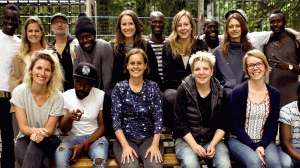I was almost a decade into my career in sustainability before I realized that most people in my field have no clue about how nature actually works.
I had many years of experience in business and sustainability as the head of the Copenhagen Climate Council, involving business leaders in the run up to the COP15 talks in my home city of Copenhagen. Yet after an accident which led to me being unable to work for over a year (something I speak about in my TEDx talk) I realized that the love for nature that had inspired this path was leading me into a dead end. That despite decades of sustainable development, the world I was looking at was more degenerative than ever. Resource scarcity, phenomenal levels of stress and burnout, unpredictable and disruptive innovations, rampant social inequality, competitive and volatile people in leadership positions, fragile supply chains, social tensions… the list goes on.
On top of this, the climate of our planet was, and still is, changing faster than expected, putting additional critical pressure on all our systems. A recent WWF report found that there has been a 69% decline in the wildlife populations of mammals, birds, amphibians, reptiles and fish, across the globe in the last 50 years.
As I recovered from my injury, I began diving into the fields of biomimicry, indigenous wisdom, circular economy and developmental psychology. I started to believe that for us to even attempt to have a less degenerative impact on our Earth’s ecosystems, then we need to understand how nature works and start tapping into this intelligence to redesign our organizations and operations, especially in the field of business. This is the vision that we outlined in the book I co-authored along with Giles Hutchins, called Regenerative Leadership: The DNA of life-affirming 21st century organizations.
In the book we outline how the Descartian metaphor of the organization as a machine, with a clockwork series of push-pull casualties, is not fit for the challenges of the 21st century.
Regeneration is about the cycle of renewal and regrowth, of death and life, injury and healing. Regenerative organizations see themselves as complex living systems made up of a web of relationships that do not operate in a mechanistic and predictable way. It’s the role of the regenerative leader to steward and tend for this living-system, making sure that the different parts of it are receiving the nourishment they need, rather than trying to operate or control it in a top-down manner.
A great example of a regenerative leader that I often use in my talks and writing is one of Jaime Lerner, the mayor of the city of Curitiba in Brazil, who drew from a concept known as Urban Acupuncture. I was fortunate to be in a session with him during the Rio+20 summit 10 years ago, where he shared how what he wanted to do as a leader was create more spaces for individuals to step into their own potential; more parks and green spaces, more farmers markets, more music in the streets. He walked the streets of the city, sensing into potential and challenges, talking to people and seeing how he could help to offer the conditions for life to thrive. THIS is the purpose and role of the regenerative leader – to become an ecosystem nurturer.
It may sound like an easy enough proposition, but too often people in positions of responsibility and power are showing up in impatient, stressed and triggered ways, creating degenerative ripples throughout their organizations. Leaders are often excellent analytical thinkers who can push forward with a lot of energy, but in order to become regenerative leaders they also need to hone the ability to listen deeply, speak from the heart, hold diverse perspectives, and recognise when they need to step back, pause and let others step in with their own capabilities and wisdom.
Crucially, regenerative leaders understand that we are part of nature, not separate from it. Organizations, like all living systems, will have periods of ebb and flow, expanding and contracting; the creative sprints of spring and the restorative depths of winter. Regenerative leaders are able to ride these waves with grace and grounded-ness.
At a time when “regenerative” is fast becoming a new marketing buzzword, businesses that are sincere in their desire to have a regenerative impact must address both these “inner” and “outer” dimensions. The “inner” is culture; everything from respectful communication, the ability to be reflective, decision-making processes, self-managing approaches, diversity, inclusion and wellbeing. The “outer” is value propositions; everything from products, services, stakeholder-relations, product design and supply chains. Although there is nothing wrong with a company sharing that they’re on a regenerative journey yet still far from being regenerative, regeneration is also not something for the marketing team alone. A life-affirming business is one that enables employees, stakeholders, wider society and the more-than-human environment to thrive.
Lastly, although it is frustrating for some, there is no “formula” for regenerative leadership or business. With this in mind, my organization Regenerators and I have designed and launched a one-year long Regenerative Leadership Journey focused on providing individuals with the support and materials they need to gain an embodied understanding of regenerative leadership, lean into their purpose and embrace uncertainty and the unknown. This year-long journey is for executives, coaches, educators, HR-professionals, students, founders and entrepreneurs who want to step into their role as regenerative leaders and start to have a regenerative impact in their lives and work.
Although many things about the world today fill me with grief and sadness, it’s my belief that when more and more people start to step into their true essence, and embrace regenerative principles in their organizations, communities and lives, it unlocks the kind of creativity, ingenuity and creative potent lifeforce energy that is wildly needed in the world right now.
Regenerators Academy are currently welcoming the next cohort of co-creators to the Regenerative Leadership Journey, to set-sail in January 2023. Places are limited to 300. Visit this page to find out more.
ABOUT LAURA STORM:
Laura has spent her entire career working in the intersection of sustainability, organizational development, climate change policy and the intelligence of nature. She is the founder of Regenerators and the former head of the Copenhagen Climate Council. She has been awarded the title "Worldchanger" by Greenbiz, named one of the 30 leading women within sustainability and regeneration by Sustainable Brands, has been selected by the World Economic Forum as a Young Global Leader and a World Economic Forum Sustainability Expert. She runs regenerative transformation processes for individuals and organizations and is the co-author of Regenerative Leadership - the DNA of life-affirming 21st century organizations.










